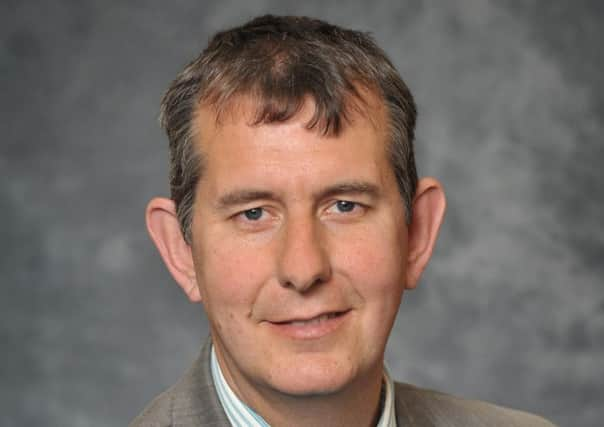DUP's Edwin Poots speaks Irish at debate


He was speaking at the MacGill Summer School in Glenties, during a discussion on north-south relationships.
The introduction of an Irish language act is a major stumbling block in efforts to restore power-sharing at Stormont, and remains a key demand of the republican party.
Advertisement
Hide AdAdvertisement
Hide AdMr Poots said his party was not opposed in principle” to legislative support for the Irish language, adding that minority languages legislation was not “in any way anti-unionist”.
But he expressed his belief that Sinn Fein wants to use the language to impose an Irish national identity in Northern Ireland.
Mr Poots spelt out his opposition bilingual road signs, a public sector quota for Irish language speakers and an Irish language commissioner with powers to sanction public authorities.
“What my party opposes is the introduction of Irish language legislation that is more about developing a sense of national identity than it is about supporting the language itself,” he added.
Advertisement
Hide AdAdvertisement
Hide Ad“What we don’t want is for Irish to be invasive in the lives of those who do not choose to speak the language.
“Anyone who speaks and loves the Irish language is as much a part of Northern Ireland life as a collarette-wearing Orangeman. I want them to feel at home and feel respected and part of society.”
The Lagan Valley MLA branded called Sinn Fein “reckless” for putting a proposed Irish langauge act above setting a budget, health reform and Brexit planning.
At the end of the speech Mr Poots said: “Maireann an chraobh ar an bhfál ach ní mhaireann an lámh do chuir.
Advertisement
Hide AdAdvertisement
Hide Ad“Forgive my broken Irish, but for those of you who, like me, are not fluent it translates to: ‘The branch lives on the hedge though the hand that planted it be dead.’
“It’s an old Irish saying reminding us of our mortality and that our actions today will live long after we are gone.
“May we work together both north-south and east-west to ensure the best for all these British Isles.”
Ciarán Mac Giolla Bhéin, advocacy manager for Irish language group, Conradh na Gaeilge (The Gaelic League), welcomed the gesture made by Mr Poots in speaking Irish at the event, adding that it would help “break down barriers and open doors for further discussion”.
Advertisement
Hide AdAdvertisement
Hide AdHowever, he felt that any legislation to protect the Irish language would be “merely a paper-exercise” if it ignored elements such as bilingual road signs, a public sector quota for Irish language speakers and an Irish language commissioner.
He told the News Letter: “These are three of the main elements that we would want to see included in any act. Mr Poots has said he wants to see the stigma taken out of Irish language, and that is exactly what these measures would achieve.
“Having bilingual signs only in nationalist areas only serves to deepen divisions. We have found that many people from a Protestant background who became interested in learning the Irish language did so because of an interest in place names.”
Mr Mac Giolla Bhéin also felt that having an Irish language commissioner would serve to further de-politicise the language by “appointing someone objective and free from any political baggage”.
Advertisement
Hide AdAdvertisement
Hide AdBack in April, Conradh na Gaeilge met a DUP delegation in April, including party leader Arlene Foster and Mr Poots.
The organisation claims Mr Poots told them their proposed figure of £19m for implementing an Irish language act was “reasonable”.
When asked if this was an accurate reflection of the DUP’s stance on the matter, a party spokesperson said at the time: “Our views are well known and documented.
“We want to see mutual respect for all languages and cultures in Northern Ireland but not one elevated above all others.”
Advertisement
Hide AdAdvertisement
Hide AdConradh na Gaeilge has laid out its proposed costings for the implementation an Irish-language Act, stating it would require £2m per year with an additional, one-off, cost of £9m needed to build the basic infrastructure to support the practical implementation of the legislation.
These costs are based on a five-year plan over the lifespan of an Executive, leaving the total five year cost at £19m. The group also believes the cost should decrease over time.